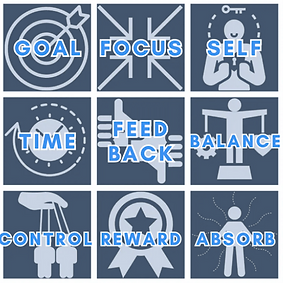

Flow
Are you in a flow?
According to the flow theory, you are in a heightened state of consciousness, in which working and learning go together effortlessly and you are completely absorbed in the activity.
Flow theory and language acquisition
Flow refers to a mental state of complete concentration and engagement in an activity that is both enjoyable and challenging. It is the ideal balance between boredom and stress — precisely where effective learning experiences and lasting knowledge transfer occur.
Flow theory was developed by Hungarian psychologist Mihály Csíkszentmihályi. According to him, when we reach a state of flow, our emotions become in tune with what we are doing. In those moments, he argued, people experience the greatest happiness and deepest satisfaction.
Flow is a mental state of intense concentration and total engagement. In this state, the outside world seems to disappear—nothing else matters. Flow is also described as “being in the zone.” It is a state in which we are intrinsically motivated, completely absorbed in the task at hand, and enjoying the process itself.
Think of a time in your life when you were so absorbed in an activity that you forgot everything else around you. That was flow. Csíkszentmihályi described it this way: "To be completely absorbed in an activity for its own sake. The ego disappears. Time flies by. Each action, movement, or thought flows naturally from the previous one—like playing jazz. Your whole being is involved, and you are using your full potential." We can often go in and out of this state without even noticing. It happens more naturally than we think. Research shows that people with higher emotional intelligence experience more moments of flow. They are more open to subtle signals and inner processes that enable flow, and are less affected by internal blockages or resistance.
Csíkszentmihályi identified nine components of flow:
-
Goals: Clear and concise. The goals of the activity are achievable and match one’s skills.
-
Focus: A high level of concentration.
-
Self-awareness: A loss of self-awareness and the control that can accompany it.
-
Time: A changed sense of the passage of time.
-
Feedback: Direct feedback on the performance of the activity. It is important to know where you are going wrong and what you are doing well so that you can adjust your actions.
-
Balance: The skill and challenge are matched.
-
Control: The feeling that you are in control of the activity.
-
Rewarding: The activity itself is experienced as rewarding.
-
Absorption: People become so absorbed in the activity that their focus becomes extremely limited.


At Language Flow, we strive to design tasks and activities in our language training that maximize the opportunity to experience flow. In this way, we not only increase the engagement of students, but also enhance the learning process itself.
What are the components of our flow lessons?
Balance between challenge and skill
There must be a balance between what you can do and what is asked of you. If a task is too easy, you will get bored. If it is too difficult, frustration will follow. Flow occurs precisely at that tension where challenge and skill are in balance.
Clear and measurable goals
Goals are the foundation of success. Vaguely formulated goals lead to confusion and lack of direction. By making your language goals concrete and measurable, you give direction to your learning process and take responsibility for your progress.
Direct and clear feedback
Feedback is essential to know where you stand. Teachers and fellow students can help, but self-reflection is at least as important. Feedback shows whether your approach is working. It is then up to you to do something with it—or not.
Full attention to the task
Concentration is a prerequisite for effective language acquisition. If you divide your attention (such as texting during a film in the target language), your efforts will be diluted. Full focus helps you become aware of your language knowledge and gaps in it.
Time perception changes
During flow, we lose the sense of time. Hours seem like minutes. As soon as your thoughts wander to other things (food, stress, plans), you notice that you have lost the flow again.
Loss of self-awareness
Just as time fades, so does your sense of ‘I’. You forget your worries, your doubts, and even your purpose. Everything revolves around the task and your full involvement.
Finally, Flow is not a permanent state—you move in and out of it all day long. But with practice, you can learn to stay in it longer. By limiting distractions and staying mentally present, you develop the ability to enter flow more often and more deeply. So consciously choose a language course that allows for flow. This way, learning not only becomes more effective, but also a lot more fun.
Balance between
challenge and skill
Clear and measurable
goals
Direct and clear
feedback
Full attention
to the task
Time perception
changes
Loss of
self-awareness

